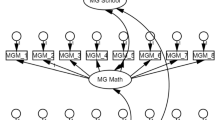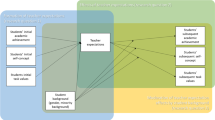Abstract
Gender differences in mathematics and verbal self-concept, performance expectations, intrinsic motivation, and goal orientation were examined in 4 samples of Norwegian students. A total of 907 students in 6th grade (n = 277), 9th grade (n = 239), 11th grade (n = 264), and adult students enrolled in first year of senior high school (n = 127) participated in the study. Findings indicated that gender differences continue to exist. Male students had higher self-concept, performance expectations, intrinsic motivation, and self-enhancing ego orientation in mathematics than did female students, whereas female students had higher intrinsic motivation for learning language than did male students. Older students had higher verbal than mathematics self-concept regardless of gender.
Similar content being viewed by others
references
Ames, C. (1992). Classrooms: Goals, structures, and students motivation. Journal of Educational Psychology, 84, 261-271.
Ames, C., & Archer, J. (1988). Achievement goals in the classroom: Students' learning strategies and motivation processes. Journal of Educational Psychology, 80, 260-267.
Bandura, A. (1986). Social foundations of thought and action: A social cognitive theory. Englewood Cliffs, NJ: Prentice-Hall.
Bong, M. (2001). Role of self-efficacy and task-value in predicting college students' course performance and future enrollment intentions. Contemporary Educational Psychology, 26, 553-570.
Byrne, B. M., & Gavin, D. A. W. (1996). The Shavelson model revisited: Testing for structure of academic self-concept across pre-, early, and late adolescents. Journal of Educational Psychology, 88, 215-228.
Byrne, B. M., & Shavelson, R. J. (1986). On the structure of adolescent self-concept. Journal of Educational Psychology, 78, 474-481.
Cheryan, S., & Bodenhausen, G. V. (2000). When positive stereotypes threaten intellectual performance: The psychological hazards of “model” minority status. Psychological Science, 11, 399-402.
Cohen, J. (1988). Statistical power in the behavioral sciences (2nd ed.). Hillsdale, NJ: Erlbaum.
Covington, M. V. (1992). Making the grade: A self-worth perspective on motivation and school reform. Cambridge, UK: Cambridge University Press.
Duda, J. L., & Nicholls, J. G. (1992). Dimensions of achievement motivation in schoolwork and sport. Journal of Educational Psychology, 84, 290-299.
Eccles, J. S. (1987). Gender roles and achievement patterns: An expectancy value perspective. In J. M. Reinisch, L. A. Rosenblum, & S. A. Sanders (Eds.), Masculinity/femininity: Basic perspectives (pp. 240-280). New York: Oxford University Press.
Eccles, J., Adler, T. F., Futtermen, R., Goff, S. B., Kaczala, C. M., Meece, J. L., et al. (1983). Expectations, values and academic behaviours. In J. T. Spence (Ed.), Achievement and achievement motivation (pp. 75-146). San Francisco: Freeman.
Eccles, J., Wigfield, A., Harold, R. D., & Blumenfeld, P. (1993). Age and gender differences in children's self-and task perceptions during elementary school. Child Development, 64, 830-847.
Elliot, A. J., & Harackiewicz, J. M. (1996). Approach and avoidance achievement goals and intrinsic motivation: A mediational analysis. Journal of Personality and Social Psychology, 70, 461-475.
Gottfried, A. (1990). Academic intrinsic motivation in young elementary school children. Journal of Educational Psychology, 82, 525-538.
Hackett, G., Betz, N. E., O'Halloran, M. S., & Romac, D. S. (1990). Effects of verbal and mathematics task performance on task and career self-efficacy and interest. Journal of Counseling Psychology, 37, 169-177.
Hyde, J. S., Fennema, E., Ryan, M., Frost, L. A., & Hopp, C. (1990). Gender comparisons of mathematics attitudes and affect: A meta analysis. Psychology of Women Quarterly, 14, 299-324.
Jackson, L. A., Hodge, C. N., & Ingram, J. M. (1994). Gender and self-concept: A reexamination of stereotypic differences and the role of gender attitudes. Sex Roles, 30, 615-630.
Manger, T., & Eikeland, O. J. (1998). The effect of mathematics self-concept on girls' and boys' mathematical achievement. School Psychology International, 19, 5-18.
Marsh, H. W. (1989). Sex differences in the development of verbal and mathematics constructs: The High School and Beyond Study. American Educational Research Journal, 26, 191-225.
Marsh, H. W. (1990). SDQ II: Manual & research monograph. New York: The Psychological Corporation, Harcourt Brace Jovanovich.
Marsh, H. W. (1993). Academic self-concept: Theory, measurement, and research. In J. Suls (Ed.), Psychological perspectives on the self (Vol. 4, pp. 59-98). Hillsdale, NJ: Erlbaum.
Marsh, H. W., & Craven, R. G. (2000, October). Swimming in the school: Expanding the scope of the Big Fish Little Pond Effect. Paper presented at the Self Research Centre Conference, Sydney, Australia.
Marsh, H. W., & Yeung, A. S. (1997). Coursework selection: Relations to academic self-concept and achievement. American Educational Research Journal, 34, 691-720.
Marsh, H. W., & Yeung, A. S. (1998). Longitudinal structural equation models of academic self-concept and achievement: Gender differences in the development of math and English constructs. American Educational Research Journal, 35, 705-738.
Meece, J. L., Parsons, J. E., Kaczala, C. M., Goff, S. B., & Futterman, R. (1982). Sex differences in math achievement: Toward a model of academic choice. Psychological Bulletin, 91, 324-348.
Middleton, M. J., & Midgley, C. (1997). Avoiding the demonstration of lack of ability: An under-explored aspect of goal theory. Journal of Educational Psychology, 89, 710-718.
Miller, J. B. (1985). Toward a new psychology of women (2nd ed). Boston: Beacon.
Muijs, R. D. (1997). Predictors of academic achievement and academic self-concept: A longitudinal perspective. British Journal of Educational Psychology, 67, 263-277.
Nicholls, J. G. (1983). Conceptions of ability and achievement motivation: A theory and its implications for education. In S. G. Paris, G. M. Olson, & H. W. Stevenson (Eds.), Learning and motivation in the classroom (pp. 211-237). Hillsdale, NJ: Erlbaum.
Nicholls, J. G. (1989). The competitive ethos and democratic education. Cambridge, MA: Harvard University Press.
Pajares, F., & Miller, M. D. (1994). Role of self-efficacy and self-concept beliefs in mathematical problem solving: A path analysis. Journal of Educational Psychology, 86, 193-203.
Pajares, F., & Miller, M. D. (1995). Mathematics self-efficacy and mathematics performances: The need for specificity of assessment. Journal of Counseling Psychology, 42, 190-198.
Sax, L. (1994). Mathematical self-concept: How college reinforces the gender gap. Research in Higher Education, 35, 141-166.
Seifert, T. L. (1995). Characteristics of ego-and task-oriented students: A comparison of two methodologies. British Journal of Educational Psychology, 65, 125-138.
Skaalvik, E. M. (1997a). Issues in research on self-concept. In M. Maehr & P. R. Pintrich (Eds.), Advances in motivation and achievement (Vol. 10, pp. 51-97). New York: JAI Press.
Skaalvik, E. M. (1997b). Self-enhancing and self-defeating ego-orientation: Relations with task and avoidance orientation, achievement, self-perceptions, and anxiety. Journal of Educational Psychology, 89, 71-81.
Skaalvik, E. M., & Hagtvet, K. A. (1990). Academic achievement and self-concept: An analysis of causal predominance in a developmental perspective. Journal of Personality and Social Psychology, 58, 292-307.
Skaalvik, E. M., & Rankin, R. J. (1990). Math, verbal, and general academic self-concept: The Internal/External Frame of Reference Model and gender differences in self-concept structure. Journal of Educational Psychology, 82, 546-554.
Skaalvik, E. M., & Rankin, R. J. (1994). Gender differences in mathematics and verbal achievement, self-perception, and motivation. British Journal of Educational Psychology, 64, 419-428.
Skaalvik, E. M., & Skaalvik, S. (2002). Internal and external frames of reference for academic self-concept. Educational Psychologist, 37, 233-244.
Skinner, E. A., Wellborn, J., & Connell, J. (1990). What it takes to do well in school and whether I've got it: A process model of perceived control and children's engagement and achievement in school. Journal of Educational Psychology, 82, 22-32.
Stake, J. E. (1992). Gender differences and similarities in self-concept within everyday contexts. Psychology of Women Quarterly, 16, 349-363.
Steele, C. M. (1997). A threat in the air: How stereotypes shape intellectual identity and performance. American Psychologist, 52, 797-811.
Walsh, M., Hickey, C., & Duffy, J. (1999). Influence of item content and stereotype situation on gender differences in mathematical problem solving. Sex Roles, 41, 219-240.
Watt, H. M. G. (2000). Measuring attitudinal change in mathematics and English over the 1st year of junior high school: A multidimensional analysis. Journal of Experimental Education, 68, 331-361.
Wigfield, A., & Karpathian, M. (1991). Who am I and what can I do? Children's self-concepts and motivation in achievement situations. Educational Psychologist, 26, 233-261.
Wilgenbusch, T., & Merrill, K. W. (1999). Gender differences in self-concept among children and adolescents: A meta-analysis of multidimensional studies. School Psychology Quarterly, 14, 101-120.
Zimmerman, B. J., & Kitsantas, A. (1999). Acquiring writing revision skill: Shifting from process to outcome self-regulatory goals. Journal of Educational Psychology, 91, 241-250.
Zuckerman, D. M. (1989). Stress, self-esteem, and mental health: How does gender make a difference? Sex Roles, 20, 429-444.
Author information
Authors and Affiliations
Corresponding author
Rights and permissions
About this article
Cite this article
Skaalvik, S., Skaalvik, E.M. Gender Differences in Math and Verbal Self-Concept, Performance Expectations, and Motivation. Sex Roles 50, 241–252 (2004). https://doi.org/10.1023/B:SERS.0000015555.40976.e6
Issue Date:
DOI: https://doi.org/10.1023/B:SERS.0000015555.40976.e6




